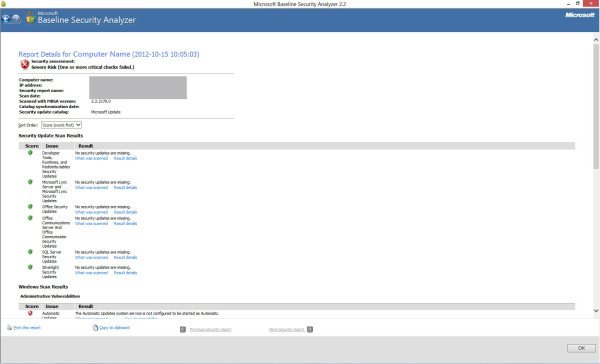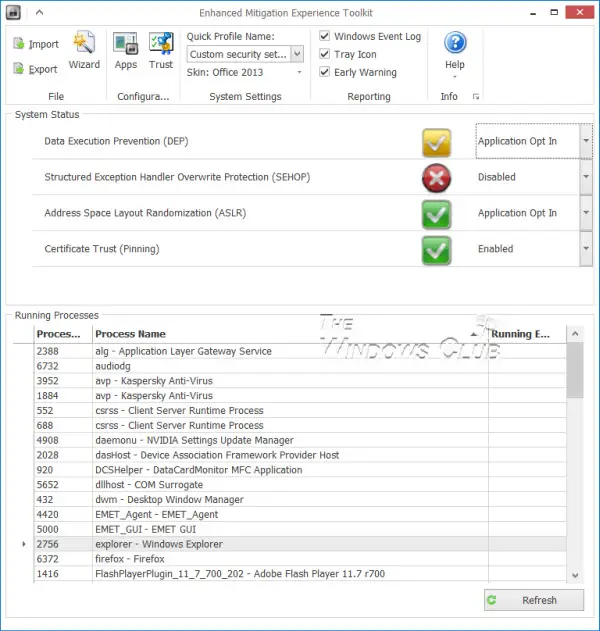Microsoft recently kicked off a blog series to cover all the security tools being offered by them on the Microsoft Security Blog. These tools deserve respect as these programs keep your system malware-free and protected.

Free Security Tools from Microsoft
Apart from Microsoft Security Essentials and Windows Defender in Windows 10, the free antivirus software downloads from Microsoft, which most of us are familiar with, Microsoft offers many more security tools for home users, network administrators, and IT Pros. This list provides a summary of such useful tools.
- Windows Defender Offline
- Microsoft Baseline Security Analyzer
- Microsoft Safety Scanner
- Malicious Software Removal Tool
- URLScan Tool
- Portqry
- Threat Modeling Tool
- Anti-Cross Site Scripting Library
- DNSLint
- NBLookup
- BinScope Binary Analyzer
- Attack Surface Analyzer
- banned.h
- Enhanced Mitigation Experience Toolkit.
1] Windows Defender Offline
Windows Defender Offline, earlier called Microsoft Standalone System Sweeper Tool, is a reliable software solution to keep your computer protected from rootkits, find potentially unwanted programs and have them removed from your PC. The primary benefit of using this tool is that it runs before malware, such as rootkits, can hide. Apart from above, Windows Defender Offline comes equipped with the Microsoft Active Protection Service (shortly known as MAPS) that automatically reports malware to Microsoft, thus providing you with better protection.
The standalone software alerts the user if it comes across any unsafe application, prompting the user to take action (accepts or deny the risk). Thus, offering complete protection in real-time.
2] Microsoft Baseline Security Analyzer

Microsoft Baseline Security Analyzer is of immense help to IT professionals and small and medium-sized businesses that periodically require to check whether their security state is in accordance with Microsoft security recommendations. If not, offer specific remediation guidance.
Via built-in checks, MBSA works to identify missing security updates, administrative vulnerabilities and common security misconfigurations on individual systems. The program scans one or more computers by domain, IP address range or another grouping. Once complete, the MBSA provides a detailed report and instructions on how to help turn the systems into a more secure working environment.
3] Microsoft Safety Scanner
Microsoft Safety Scanner is an on-demand scanner that flushes out malware, such as a virus, trojan or potentially dangerous software holed up in your system. It requires no administrator privileges for scanning the system and its well-developed wizard, prompts a user to pick from three different types of scan quickly:
- Quick scan
- Full scan
- Customized scan.
No real-time protection is available and usable for just 10 days after launched for the first time.
4] Malicious Software Removal Tool
Malicious Software Removal Tool is yet another free security scanner from Microsoft for Windows users, that helps remove specific, prevalent malicious software from computers that are running Windows 10, Windows 8, Windows 7, Windows Vista, Windows Server 2003, Windows Server 2008, or Windows XP.
5] URLScan Tool
URLScan Tool from Microsoft helps you protect your web servers and stay away deliberately from undesirable attacks and exploits. How does the program work? Firstly, it scans incoming URL requests and associated data with a series of rules to determine whether there is a threat if any. Then, it only allows those requests to pass that comply with guidelines created by the administrator. This improves the security of the server and ensure that the tool or system only responds to valid requests. More, here. For the step-by-step configuration of the URLScan tool, visit here.
6] Portqry
Portqry is a command-line utility that one can use to troubleshoot TCP/IP connectivity issues. The application reports the port status of TCP and UDP ports on a computer you choose. In short, it behaves much like a TCP/IP connectivity test tool, port scanner, and local port monitor. Portqry is a great lightweight port scanner regardless of the version of Windows you run.
7] Threat Modeling Tool
The SDL Threat Modeling Tool helps engineers analyze the security of their systems to find and address design issues early in the software lifecycle.
8] Anti-Cross Site Scripting Library
The Microsoft Anti-Cross Site Scripting Library (AntiXSS V4.2.1) is an encoding library designed to help developers protect their ASP.NET web-based applications from XSS attacks. Learn more about it here.
9] DNSLint
DNSLint is a Microsoft Windows utility that helps you to diagnose common DNS name resolution issues.
10] NBLookup
NBLookup is a command-line diagnostic tool that uses the User Datagram Protocol to send NetBIOS name queries to Microsoft Windows Internet Naming Service servers.
11] BinScope Binary Analyzer
The BinScope Binary Analyzer tool can be helpful for both developers and IT professionals that are auditing the security of applications that they are developing or deploying / managing.
12] Attack Surface Analyzer
Attack Surface Analyzer can help software developers and Independent Software Vendors understand the changes in Windows systems’ attack surface resulting from the installation of the applications they develop.
13] banned.h
The banned.h header file is a sanitizing resource that is designed to help developers avoid using and help identify and remove banned functions from code that may lead to vulnerabilities.
14] Enhanced Mitigation Experience Toolkit

Enhanced Mitigation Experience Toolkit or EMET is one of the best security tools for Windows 10/8 that helps prevent vulnerabilities in installed software from being exploited by malware and malicious processes.
This is achieved with the help of security mitigation technologies, which function as special protections and obstacles that an exploit author must defeat to exploit software vulnerabilities. NOTE: EMET has been deprecated now.
Does Microsoft provide free security?
Windows Security is the complete protection suite provided to all Windows 11/10 users for free. It includes Virus & threat protection, Account protection, Firewall & network protection, App & browser control, Device security, Device performance & health, and Family options. You can also view Protection history in Windows Security.
Which is a Security app by Microsoft?
Microsoft Defender Antivirus is a free security app by Microsoft. It provides complete protection against threats, including viruses, malware, etc. You can run different types of scans on your system using Microsoft Defender. Previously, it was Windows Defender but when Microsoft made it available for multiple platforms, including Android and iOS, Microsoft changed its name from Windows Defender to Microsoft Defender.
SKYPE=ROCKY-TIGER-USA G-TALK=PRINCESS.JASMINE.WOOD@GMAIL.COM MSN LIVE=TIGER_0717@HOTMAIL.COM MSN LIVE=ROCKY_0717@YAHOO.COM MSN LIVE=ROCKY-TIGER@WINDOWSLIVE.COM QQ=859061471 AOL-AIM=ROCKY_TIGER@AOL.COM